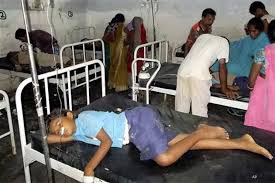New Delhi, Jul 24: The absconding principal of the school in Saran district where 23 children died after taking poisoned food was on Wednesday taken into custody by police, eight days after the midday meal tragedy that rocked Bihar.
Bihar Chief Minister Nitish Kumar said the principal is being questioned and the incident will be probed from all possible angles.
“The investigation is on. The principal of the school is in police custody. We will probe the incident from all possible angles,” Mr. Nitish told reporters in Patna.
Ms. Meena Devi, principal of Dharmasati Gandaman primary school in Chhapra in Saran district, was held even as a notice declaring her as a proclaimed offender was pasted at her Chhapra home.
The notice asked Ms. Meena Devi to present herself before the police immediately failing which the process of attachment of her property will start, Saran Superintendent of Police Sujeet Kumar told PTI.
Ms. Meena Devi is an accused in the FIR filed in connection with the midday meal tragedy on July 16 and has been on the run for over a week. Police had conducted raids in different locations to nab the principal.
She has been charged in the FIR under IPC 302 (murder) and 120-B (criminal conspiracy). A probe report by Saran Commissioner Shashi Shekhar Sharma and DIG Vinod Kumar submitted to the government has found the principal responsible for the tragedy.





Comments
Add new comment